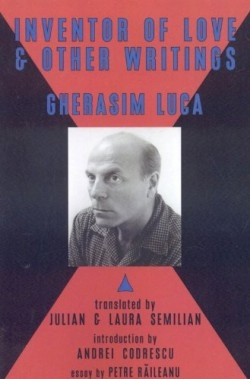Inventor of Love & Other Writings (Translation Series)
On February 9, 1994, after being evicted from his Paris apartment, the Romanian poet Gherasim Luca committed suicide by jumping into the Seine River. Though tragic, his death could hardly have been a shock to his readers. For the previous forty-two years Luca had been living illegally in France, publishing dozens of volumes of surrealist poetry. His writing was often dark and dwelled on themes of violence and death.
The Inventor of Love, a small book that Luca wrote in the mid-1940s, is a potent sample of his powerful, if frequently bewildering, writing. In a section titled “The Dead Death,” for example, Luca prefigures his own end by depicting five fictional suicide attempts, complete with fabricated notes. Offered for the first time in English, The Inventor of Love adds to a small but growing collection of Luca’s work available in English.
Born Salman Locker to a Jewish family in Bucharest in 1913, Luca adopted his pen name when he began to publish in the avant-garde Romanian magazine Alge in the early 1930s. Though little known in the English-speaking world, Luca became part of influential surrealist groups in Paris and Bucharest during the 1930s and ’40s, and his admirers included the French philosopher Gilles Deleuze, who called him “a great poet among the greatest.” If he is not universally popular, however, it is not hard to see why.
Luca’s writing is largely unclassifiable, though it might be described as part surrealist prose poem and part philosophical manifesto. At times it seems as though he is attempting to transcend the limits of language itself. Like a bee in a jar that will burst its brains trying to fly through the glass, Luca often seems to be trying to say what cannot be said. And while much of Luca’s writing is violent and dark, it also erupts in energy and exuberance. “Monocle fitted to my eyeball, mustache twisting with panache, I stride forth, reckless and virile, spellbound and entrancing, slurping with swelling cheeks this magnificent poisonous broth which is our internal life,” he exclaims.
While Luca’s writing is always challenging and frequently difficult, the publication of his work in English is an important step in securing his legacy, a decade and a half after his untimely death. (October) Ezra Glinter
Disclosure: This article is not an endorsement, but a review. The publisher of this book provided free copies of the book to have their book reviewed by a professional reviewer. No fee was paid by the publisher for this review. Foreword Reviews only recommends books that we love. Foreword Magazine, Inc. is disclosing this in accordance with the Federal Trade Commission’s 16 CFR, Part 255.

